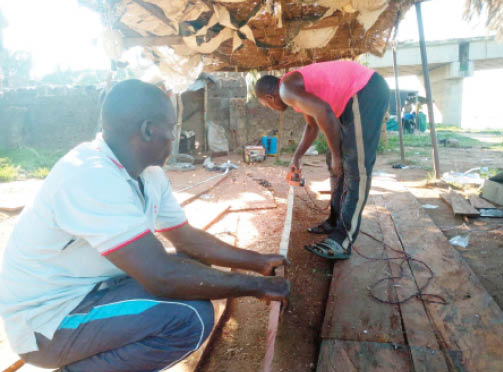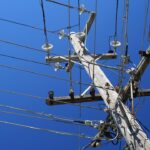On the Benue River bank snaking between Nigeria and Cameroon, Dauda Irmiya, has carried on his fathers’ career of making boats that form a lifeline for the riverine communities in Adamawa. Our correspondent spends a day with him and reports.
At the River Benue bank in Jimeta Yola, 51-year-old Dauda Irmiya and his work men were busy cutting wood planks and aluminum sheets a few meters away from the Marine police station and the Nigerian Customs Service post.

A closer look at the skilled men revealed they were constructing a canoe, a product that is at the centre of fishing and navigation on the river which flows all the way from Cameron to Nigeria’s delta and into the Atlantic and on which hundreds of people earn their daily incomes.
The river bustled with commercial activities as dozens of labourers offloaded freight from a large wooden vessel that arrived from Garoua in Cameroon in to a riverside warehouse while fishermen and fish vendors carried on with their normal businesses.
Dauda was only a small boy when his father, a fisherman and skilled labourer migrated from Abise in Benue State to Adamawa in 1969, briefly settling in Numan before moving to Jimeta in Yola metropolis. The father, a construction carpenter then had no idea that a new version of his trade awaited him in his new abode.
As a Jukun man from Abinse, his family members were mostly fishermen by tradition with strong affiliation to water, yet that did not stop them from venturing in to other trades to complement their income in their new home.
As soon as they settled in Jimeta, Dauda was enrolled into Doubeli Primary School. After his primary education, he gained entry into Army Barracks Day Secondary School and later completed his secondary education in Yelwa Secondary School in Yola in 1988. After school hours, the young Dauda worked as an apprentice in his father’s workshop.
He told Daily Trust that his father introduced the new way of building canoes using wood planks to the area as against the old way of carving it from tree trunks, saying the idea had benefited the people of Yola and surrounding areas and that his father found out that it was possible to construct a canoe, using only four wood planks, nails, and a foam-like materials.

“My father was excited because used only four planks to construct a canoe within two days instead of taking one month to carve it out of a tree trunk. This one is easier and cost effective and easy to work with on the waters,” he explained.
A visit to Dauda’s workshop, located on the Benue river bank in Jimeta, revealed the expertise with which the canoe builder transforms wood planks in to a water tight object that is used for navigation and fishing trade.
“I learnt to build canoes from my father since 1984 as family business, we started here on the sand at the location of that warehouse before we shifted to this place. Our Customers come from all over Adamawa including Numan axis and beyond. We normally construct for people on request.” he said.
The workshop makes canoes in different sizes depending on the order placed by customers. They have the expertise to make engine boats which are bigger in size than paddled canoe.
“We build different sizes of vessels; the difference is the number of planks used just like tailors use more material to sew bigger clothes. We need more planks to build engine boats,” Dauda explained.
Mahogany wood is the preferred material for canoe making due to its strength and durability. Iroko is second option and white wood is the cheapest and less reliable of all.
Making a boat, Dauda uses hammers, nails, a navigation tool, pinches and gizago, a locally made hoe-like tool for chiseling of wood.
At the beginning of construction, Dauda oversees the measurement taking with tapes and then cutting of planks to the desired shape. He then ensures planks are accurately joined together to form a base or floor of the canoe. Two planks are arranged side by side. Bososo tiles, a black foam like material is then inserted between them and plastered with aluminum sheet held together with nails. Bososo and aluminum sheet fill the gaps between planks to make it water-tight.
“We construct the seat, then the career before we turning it over to smoothen the outer surfaces with radar machine to prevent it from catching nets. Then the owner can test it in the water here if he likes. Four workers can make a canoe but a motor boat construction requires at least 10 labourers,” he said.
“From 1984 to date, I have graduated six young men who are now building canoes on their own. They have employed other young men to work at their workshops,” he adds.
“I was born in Abise in Benue State. I am from the Chief’s family and the present chief of Abise is my maternal uncle. My father relocated to Jimeta in 1969 and found that the riverine communities used gwaska (dug-out canoes) for fishing and other activities. So being a carpenter, he tried using planks to construct canoes and the idea worked,” he says.
Dauda takes special pride in the fact that his father modernized boat making in that area and every time he refers to that, a smile is drawn on his face.
The craft man believed that population increase in the upper and lower Benue led to increase demands for canoes in the fishing communities, saying his customers were fishermen, farmers and water transporters.
Farmers who have their farmlands located on the other side of the river often purchased canoes to transport themselves, farm tools and farm produce to the farm rather than depend on commercial canoe services.
But beyond his pride in his father’s legacy and his own accomplishment in creating employment and boosting the local economy, Dauda is sad that he has received no recognition or support from the government.
With the changing times, Dauda too has come under the effect of global warming. Timbre, the major material used in his work, becomes scarce in the rainy season as flood water prevents access to the timbre plantations.
Making boats has not only been a lifelong passion, it has helped him raise and maintain a family.
“I have one wife and six children and live in Jimeta in Yola metropolis, I have my house. All my children go to school because I want then to be educated. My daughter is currently a final year student in Moddibo Adama University of Technology (MAUTECH),” he said.
The contributions of people like Dauda to the development and growth of riverside communities cannot be underestimated, according to Joe Adanu, a journalist with interest in fishing and water transportation.
“Without adequate supply of vessels life would not have been possible for fishermen and farmers,” he said.




